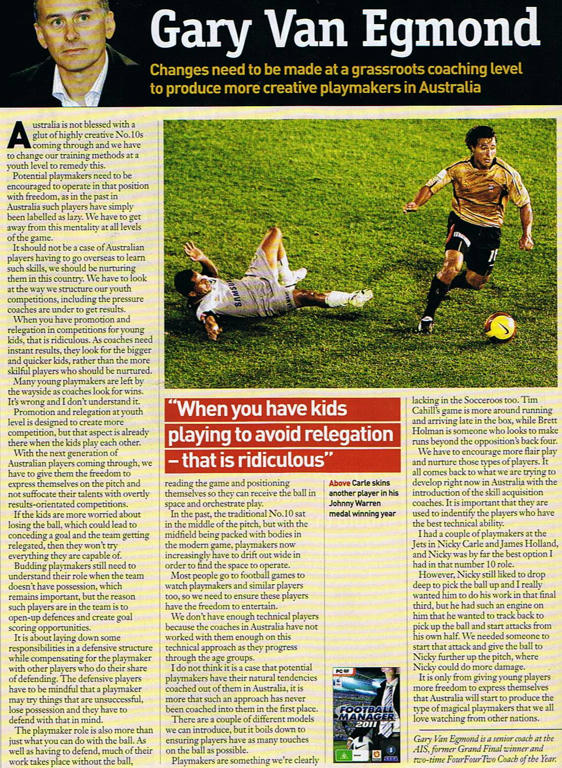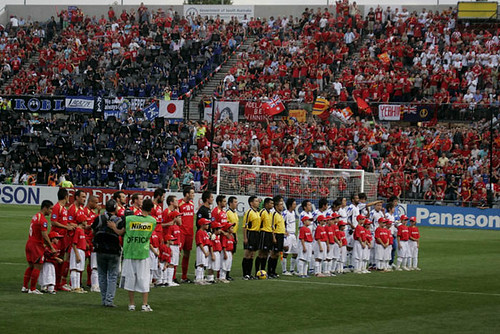Should we (South Australia) follow suite? Do we really need the U12 & U13 teams playing for points, and fighting for a top spot on a ladder? There are other ways to give these age groups a competitive game; mini tournaments, gala days, etc.
Taking the pressure off of clubs, teams and coaches to win games and finish top would open up more opportunities to concentrate on developing all the players in a team. With a tournament solution, all games prior to the tournament can be development games, true trial games where the coach tries players in different positions, without fear of the outcome of a loss.
http://pitchinvasion.net/blog/2010/07/04/inventing-the-new-germany-youth-development-and-the-bundesliga/ wrote:Inventing The New Germany: Youth Development and the Bundesliga
Germany’s system emphasises development in elite centres from a slightly older age, and focuses on small-sided skills at younger ages. Via Honigstein: “We start with the U-9s. They play four-a-side, on small pitches, to encourage individual skills,” said Thomas Albeck, head of youth development at Stuttgart. “We then add players every year, only the U-13s are playing with full teams.”
There are many lessons here to consider for countries around the world struggling with trying to work out the best way to develop young domestic talent.
http://sportsillustrated.cnn.com/2010/soccer/world-cup-2010/writers/raphael_honigstein/07/01/germany.reinvention/index.html wrote:How Germany reinvented itself
The German FA realized that something had to be done. It looked at the French system and decided that something similar was needed...All across the country, 121 national talent centers would be built to help 10- to 17-year-olds with technical practice...It's no coincidence that this is the youngest ever German team since 1934... The changes that were introduced 10 years ago have paid dividends: In the last two years, Germany won the European championship at U-17, U-19 and U-21 level..."We have undoubtedly more talent than 10 years ago,"..."We start with the U-9s. They play four-a-side, on small pitches, to encourage individual skills," Albeck said. "We then add players every year, only the U-13s are playing with full teams."
http://www.guardian.co.uk/football/2010/jul/04/germany-youth-development-england wrote:Germany provide the blueprint for England's academy system
• Germany overhauled youth development system in 2002
• Current German squad has an average age of 24.7 years
As English football looks to come to terms with another tournament failure, the head of Germany's Bundesliga has detailed how his country overhauled its failing youth football structures in the wake of Germany's "horrible" Euro 2000 performances.
The new structure, implemented in 2002, has resulted in a resurgent German side - their youngest team ever, with an average age of 24.7 years.
Seifert stated that the German system costs clubs "only euros 80m" of the Bundesliga's euros 2billion turnover. The German structure only takes boys into the academy system from the age of 12, with around 5,000 players going through the system at any one time.
English clubs currently spend more, around euros 95m per season, and put 10,000 boys aged between nine and 16 through a much-criticised structure designed by Howard Wilkinson in 1997. About 1% of boys who join an English academy aged nine become professional footballers.
England reached the European Under-21 Championships final last summer, but failed to qualify for seven of the previous 10 tournaments, and England's teams at senior and youth level have failed to win any major trophies since the academy system was established.
http://www.guardian.co.uk/football/blog/2010/jul/02/world-cup-2010-germany-flair wrote: World Cup 2010: How Germany planned a flair revolution
The transformation of Germany's football has been based on an attention to detail and investment in young talent that shames the FA and Premier League
"Ranking and results are not the only criteria. We have to look at our style, our play, our intentions," Löw says. "We thought about what football we wanted to display, what philosophy we wanted to follow, and how we'd implement that.
At grassroots level, a nationwide network of 366 training centres has been set up, mostly using the infrastructure of local clubs with above-average facilities, where 14,000 youngsters aged 11-14 receive extra tuition by way of a weekly two-hour training session imparted by a DFB-appointed coach. This is in addition to the training they do with their respective clubs. It is more than likely that some of them will feature in the German national team eight years from now.
"Further up the line there are 46 club academies. Twenty-nine German further-education schools have been designated Elite Football Schools. Students receive a perfectly normal education, up to the Abitur granting university access, but also benefit from plenty of football as part of the curriculum.
"Finally we have made sure that all the DFB's junior national teams, from U15 onwards, benefit from basically the same level of support, the backroom staff including a sports psychologist, a physical fitness coach, as well as first-rate doctors and physios. An extensive database has been set up, allowing our coaches to access information – medical data, physical test results, performance analyses, personal characteristics – for every player. Obviously, the underlying purpose of all of this is that no player with good potential shall be allowed to slip through the net."
"There was a lot of scepticism before the tournament and I kept reminding the doubters of the qualities the players have," he says. "I've had a scenario in my mind for months: this is the kind of football I want to play at the World Cup. We've been aiming for that. I didn't just want to impose some tactics on the players. Rather, this is what I wanted to do, and I selected the players around that.
"My players have to fulfil tasks. They have to be disciplined in their play. There is no straitjacket I impose on them but they have to work on the pitch within my tactics. They can't just do what they want. We have to be faithful to a particular tactical play but they've bought into it and it's been working.











